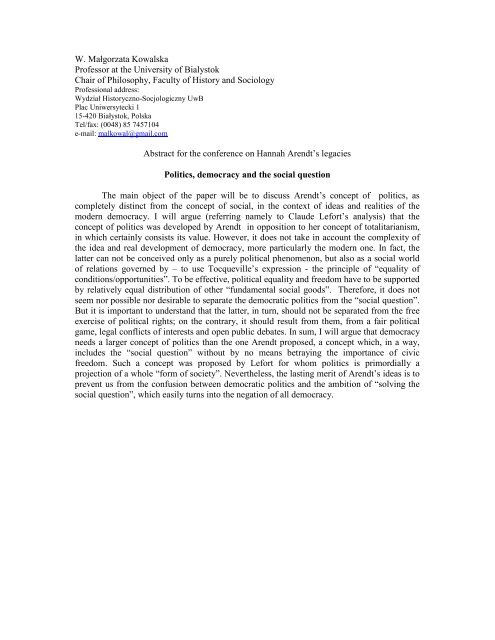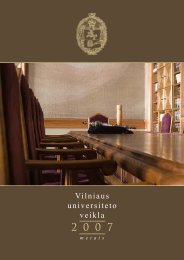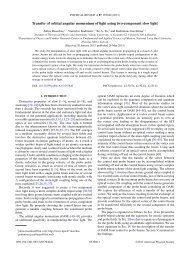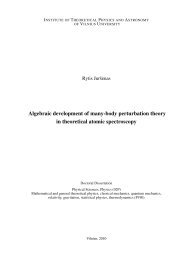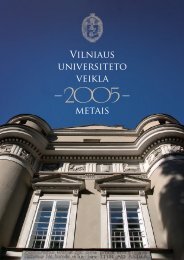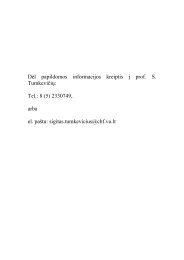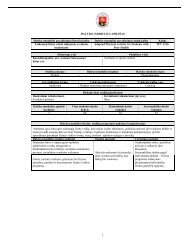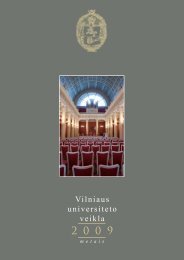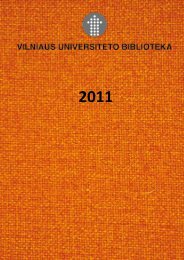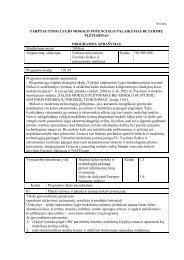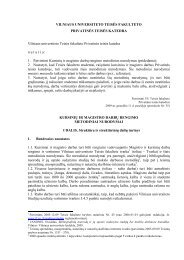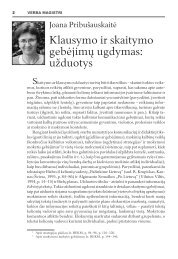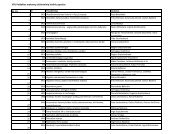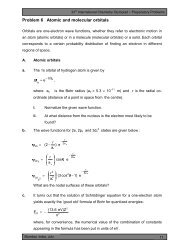Prof. Malgorzata Kowalska
Prof. Malgorzata Kowalska
Prof. Malgorzata Kowalska
- No tags were found...
You also want an ePaper? Increase the reach of your titles
YUMPU automatically turns print PDFs into web optimized ePapers that Google loves.
W. Małgorzata <strong>Kowalska</strong><strong>Prof</strong>essor at the University of BialystokChair of Philosophy, Faculty of History and Sociology<strong>Prof</strong>essional address:Wydział Historyczno-Socjologiczny UwBPlac Uniwersytecki 115-420 Białystok, PolskaTel/fax: (0048) 85 7457104e-mail: malkowal@gmail.comAbstract for the conference on Hannah Arendt’s legaciesPolitics, democracy and the social questionThe main object of the paper will be to discuss Arendt’s concept of politics, ascompletely distinct from the concept of social, in the context of ideas and realities of themodern democracy. I will argue (referring namely to Claude Lefort’s analysis) that theconcept of politics was developed by Arendt in opposition to her concept of totalitarianism,in which certainly consists its value. However, it does not take in account the complexity ofthe idea and real development of democracy, more particularly the modern one. In fact, thelatter can not be conceived only as a purely political phenomenon, but also as a social worldof relations governed by – to use Tocqueville’s expression - the principle of “equality ofconditions/opportunities”. To be effective, political equality and freedom have to be supportedby relatively equal distribution of other “fundamental social goods”. Therefore, it does notseem nor possible nor desirable to separate the democratic politics from the “social question”.But it is important to understand that the latter, in turn, should not be separated from the freeexercise of political rights; on the contrary, it should result from them, from a fair politicalgame, legal conflicts of interests and open public debates. In sum, I will argue that democracyneeds a larger concept of politics than the one Arendt proposed, a concept which, in a way,includes the “social question” without by no means betraying the importance of civicfreedom. Such a concept was proposed by Lefort for whom politics is primordially aprojection of a whole “form of society”. Nevertheless, the lasting merit of Arendt’s ideas is toprevent us from the confusion between democratic politics and the ambition of “solving thesocial question”, which easily turns into the negation of all democracy.
Curriculum vitae1. Born on July 21st 1961.2. Education:- 1985 – master of French philology at Warsaw University- 1988 – master of philosophy at Warsaw University- 1993 – doctor of philosophy- 2000 – postdoctoral degree on philosophy (”habilitacja”)3. <strong>Prof</strong>essional carrier and functions- since 1988 working at Bialystok University, first as assistant, then as adjunct (assistantprofessor), then, from 2001, as professor- since 2005 – director of the Chair of Philosophy in the Faculty of History andSociology of Białystok University4. Domains of professional interest- history of modern and contemporary philosophy, especially French- phenomenology- social and political philosophy5. Other activities and functions- translator of French contemporary philosophical literature into Polish- member of Polish Society of Phenomenology- member of the committee of the revues “Krytyka Polityczna” and “Przegląd literackofilozoficzny”- chair person of the consortium “Eastern European Philosophical Initiative”6. Main publications:a) in Polish (books):- Sartre: problem nicości, Biblioteka Idei, Białystok 1993;- W poszukiwaniu straconej syntezy. Jean-Paul Sartre i paradygmaty filozoficznegomyślenia, Spacja-Aletheia, Warszawa 1997;- Dialektyka poza dialektyką. Od Bataille’a do Derridy, Aletheia, Warszawa 2000;- Filozof w polis (editor), Białystok 2004;- Demokracja w kole krytyki, Białystok 2005.
) in French (essays)1. „Pologne à la recherche d'un nouvel équilibre politique”, in: Démocraties: l'identitéincertaine, Actes du colloque, Bourg-en-Bresse, 1993.2. „Un balancement postcommuniste”, in: Etudes, Paris, 5/1995.3. „De l’antinature à la nature postcritique”, in: La nature. Thèmes philosophiques, thèmesd’actualité, „Cahiers de la revue de théologie et de philosophie”, Genève 1996.4. „Entre l’autonomie et la dépendance: l’ambiguité du cogito”, in: L'esprit cartésien. Actesdu Congrès de l'ASPLF, Paris 2000;5. „L’existentialisme, le marxisme et le problème de l’humanisme réel”, in: Histoire de laphilosophie politique (editor Alain Renaut, t. 1-5), t. 5 Les philosophies politiquescontemporaines, Calmann-Lévy, Paris 1999.6. „La démocratie selon Sartre et la conjoncture idéologique actuelle” in: Les TempsModernes, juillet-septembre 2005.


